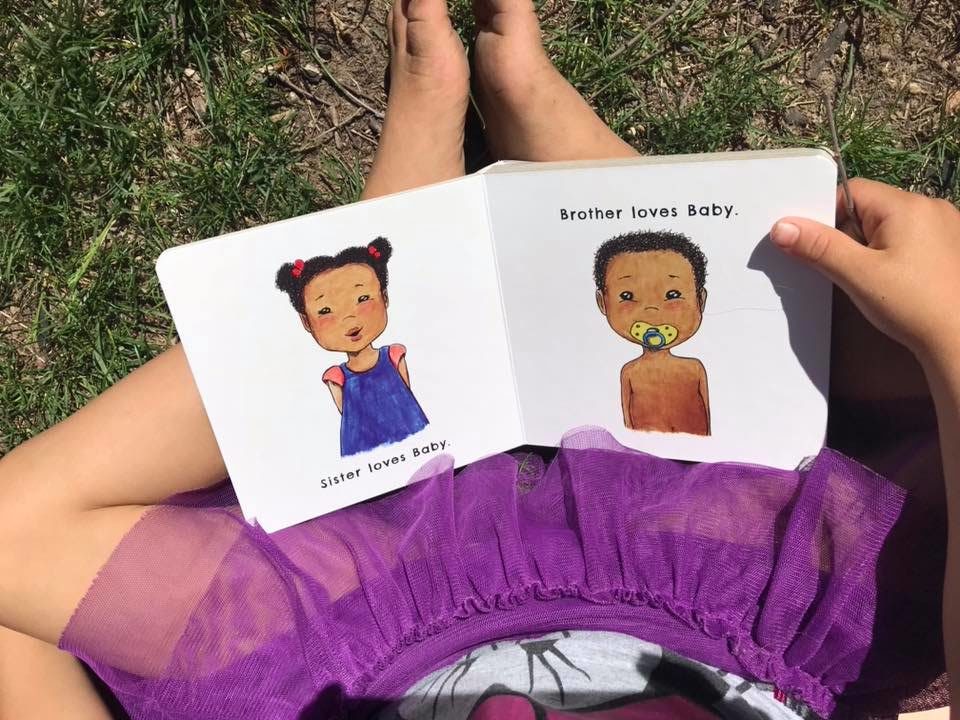It’s not often that a board book will make me cry, but that’s just what happened when I watched one of my kids (adopted from foster care) reading “Who Loves Baby” to one of my other kids. It was precious to hear him telling the story of his life as he read this book to his brother. It was finally a story that used the words of his life to explain a familiar story to us that we rarely see represented in books geared toward little children.
The “Who Loves” series is three books written by Jami Kaeb with The Forgotten Initiative for foster children to help put words to their feelings and experiences. Each one is geared toward a different age level. “Who Loves Baby?” is a board book that uses simple words and illustrations to affirm to a foster baby that they are loved by the people in their life: siblings, parents, foster parents, social workers, judges, church family, etc. Our foster children and their families have had a diversity of ethnic backgrounds, so I was glad to see that reflected in the illustrations.
“Who Loves Me?” is written for kids ages 3-7 and communicates some important and difficult truths in a simple and loving way. It affirms to foster kids that they are loved by all the members of the team who are working to help them (their parents, siblings, foster parents, social workers, church family, etc.) and it gives a few sentence definition of that person’s role. This would allow for expanded conversations with kids as they put their own names and faces to those people in their life. For three-year-olds this might be the whole conversation, but for second graders, it might just be the beginning of opening up a dialogue about their fears and frustrations with the process.
“I Am Loved” is for kids ages 7-10. It walks through the foster care process from the perspective of a foster child. It does a great job being both vague in a way that would make it relatable to almost all foster kids, but also specific in the ways that make it honest about the process. I think this book would be ideal not just for foster kids, but for the biological and adopted kids in a fostering family to help them develop empathy and understanding about what their foster siblings might be experiencing. The book does not promise a happy ending (it doesn’t talk about the child being adopted or reunified), which I think is wise. It leaves the story open-ended, as so many of our foster kids’ stories are when they come to us.
I am really persnickety when it comes to books about foster care and adoption. I am passionate about those topics and I’m passionate about writing and language, so I analyze each idea and even each word choice to make sure we aren’t communicating anything hurtful to kids in the way we talk about their family or experiences. Even with all my persnickety tendencies, this series is one I can recommend whole-heartedly. There was obviously great care used in the language choices to convey both respect and love for all parties involved. I think you can tell that the author was a loving foster and adoptive mom who had specific people and situations in mind as she was writing.
These books would be great to have in a church library. Foster care agencies would be wise to have these to lend out to foster families as they take placements. If you have a friend who is doing foster care and you’re wondering how you could help, this would be a great series of books to buy for her so she’d have them available to her foster kids. I think the “I Am Loved” book would be a great addition to even school libraries to help kids understand what it’s like to be a foster kid and for foster kids to have their feelings and experiences normalized.
Foster care can feel like a really shameful experience to the kids involved. This is unfortunate because it isn’t their fault they are in foster care. The shame shouldn’t belong to them. But part of the reason it can feel shameful is because it’s something we don’t talk about. And that’s for good reason— we want our kids to be able to have privacy. Their stories belong to them. But it also means we don’t often have the tools we need to put words to their experiences. These books are a great step forward in normalizing and affirming that these kids are loved and their stories are worth telling too.
(Here’s where you can purchase your own copies)

